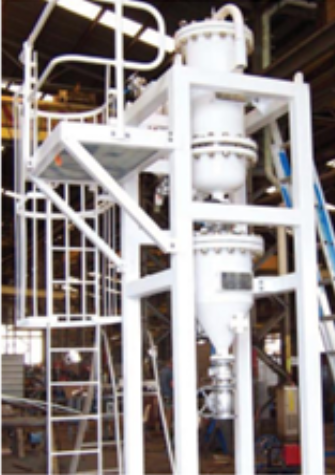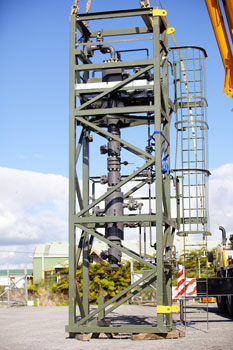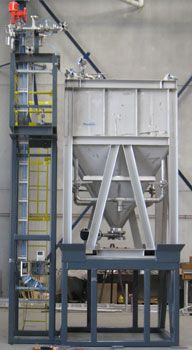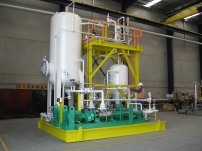Desander dB
Design Build Hydrocyclone Desander Technology
Desander dB (formerly called CYCLONIXX*) Wellhead desanders and desander cyclones are essential for trouble-free plant operation. We supply separator systems for the collection, removal, cleaning and disposal of accumulated solids in production facilities. Our design build (dB) solutions include our proprietary Desander dB phase separation systems that are a proven efficient and reliable solids separation technique.
- Desanders
-
Desander dB are a proven method of providing efficient and reliable separation of sand and solids from produced water, condensate and/or gas streams. Multiple Desanders are typically installed in a single pressure vessel and located downstream of 3-phase separators to remove solids before the fluids undergo further processing to prevent damage, fouling and blockage in downstream equipment.
Desander Cyclones Provide

- High efficiency solids removal
- Very compact solution
- Cost effective protection against erosion damage
- Low OPEX
- Low maintenance, as there are no moving parts
- Highly consistent performance
- Well-proven technology
- Suitable for use on floating systems
We offer our Desander dB in our TUNGSTONE materials range so you can be sure that they are suitable for your application no matter how severe the service. TUNGSTONE cyclones are available in:
- Tungsten carbide
- Silicon carbide
- Ceramic
- Stellite
- Wellhead Desander dB Hydrocyclones
-
Our award winning Desander dB (formerly CYCLONIXX) wellhead hydrocyclones offer a solids-separation technology specifically aimed at multi-phase well streams that is suitable for all wellhead gas/liquid ratios from 100% liquid to 100% gas. Our hydrocyclones are designed to withstand extremely harsh wellhead conditions including exposure to very high pressures, elevated temperatures and highly erosive flows.
Custom Engineered Systems

Each system is custom engineered to fit your application, including providing for a wide operating envelope to meet the changing conditions that are common in multi-phase well streams.Wellhead desanders come in a range of sizes, including some of the largest commercially available, to accommodate the vast majority of wellhead flows in a single cyclone. In addition, the cyclones are specifically designed to separate large and irregular shaped particles, as well as the more common small, round particles, without blocking.
Innovative fabrication techniques
We developed new fabrication techniques in order to cast wellhead desanders in only a few ceramic pieces rather than the traditional method of manually grouting individual ceramic tiles to form the desander. This enables us to manufacture wellhead desanders up to 700 mm diameter; the largest available on the market. This approach results in more robust hydrocyclones with minimal joins, and therefore, few points of failure. For our clients this means you can rely on Wellhead Desander Hydrocyclones to operate reliably under the extreme conditions experienced at wellheads.
Advantages
Removing solids (e.g. frac sand, proppant) at or near the wellhead offers a number of advantages including:
- Protecting downstream equipment from erosion damage
- Preventing solids build up in vessels and pipelines
- Preventing sand and other solids damaging valve seats
- Reducing the overall risk to on-going production
- Increasing production above previous limits
Applications
- Frac. sand/proppant removal from shale gas and/or oil
- Well clean-up operations
- Well start-up operations
- Under-balanced drilling operations
Materials
We offer Desander dB wellhead hydrocyclones in our TUNGSTONE materials range so you can be sure that they are suitable for your application no matter how severe the service. TUNGSTONE cyclones are available in tungsten carbide, silicon carbide, ceramic, or stellite
-
Solids Management System Design
-
Solid Sand Container Solids are often present in production facilities that, if not removed periodically, can lead to significant
 problems including:
problems including:- Solids accumulation in separators, vessels and tanks
- Reduced production capacity/capability
- Reduced equipment performance
- Instrumentation failure
- Erosion and damage to pumps, valves, and other equipment
- Increased corrosion potential
- Increased maintenance and lost in production
Stages
In developing a Solids Management scheme for your application, Veolia considers three distinct stages:
- Stage 1: Solids collection and removal from the process
- Stage 2: Solids handling and cleaning
- Stage 3: Solids disposal
Custom design
We then custom design a Solids Management system for the range of operating conditions, taking into account factors such as:
- Solids type, size and concentration
- Continuous or batch solids removal
- Method and location of solids disposal
- Presence of hazardous materials e.g. mercury, arsenic, NORM (Naturally Occurring Radioactive Material) Customized Solids Management
The customized Solids Management system could include solutions pertaining to:

- Wellhead and/or Desander Cyclones
- Vessel flushing
- Solids washing
- Solids containment for transport/disposal
- Handling of hazardous materials
